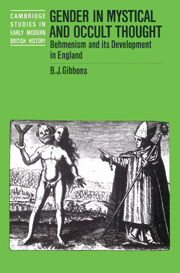Book contents
- Frontmatter
- Contents
- Acknowledgements
- 1 Introduction
- 2 Gender, sexuality and power in early modern England
- 3 Gender in mystical and occult thought
- 4 Gender in the works of Jacob Boehme
- 5 The reception of Behmenism in England
- 6 Behmenism and the Interregnum spiritualists
- 7 The female embassy
- 8 Conservative Behmenism
- 9 Wider Behmenist influences in the eighteenth century
- 10 Conclusion
- Bibliography
- Index
- Cambridge Studies in Early Modern British History
2 - Gender, sexuality and power in early modern England
Published online by Cambridge University Press: 03 November 2009
- Frontmatter
- Contents
- Acknowledgements
- 1 Introduction
- 2 Gender, sexuality and power in early modern England
- 3 Gender in mystical and occult thought
- 4 Gender in the works of Jacob Boehme
- 5 The reception of Behmenism in England
- 6 Behmenism and the Interregnum spiritualists
- 7 The female embassy
- 8 Conservative Behmenism
- 9 Wider Behmenist influences in the eighteenth century
- 10 Conclusion
- Bibliography
- Index
- Cambridge Studies in Early Modern British History
Summary
In the predominant view of the feminine in the early modern period, women were regarded as passive, sexually voracious and morally suspect, both in their own behaviour and in their effects on men. Inherently irrational, representing the flesh and its snares, women were assigned a subordinate status in the prevalent ideology. By the nineteenth century these perceptions of the feminine had been revised in women's favour by the rise of ‘Victorian sexual ideology’, involving what might be called the Romantic notion of women. A key element in this process was the desexualisation of the image of women, accompanied by a general repressive attitude to sexuality. Women were still perceived as essentially passive, but a new understanding of female passionlessness had arisen, enabling the feminine to be regarded as spiritually elevating. The middle-class woman in particular was now an ‘agent of salvation’, ‘a desexualized Madonna’. These changed perceptions were potentially empowering for women, laying the groundwork for the rise of feminism.
It should be emphasised that these remarks are intended to describe only the dominant trends in sexual ideology. Attitudes to gender and sexuality are complex and often contradictory. The grossest misogyny and an excessive adulation of women can be found in all ages; the reader of Nunnery tales (a popular pornographic magazine) is likely to form a different impression of Victorian women's sexual reserve than the reader of Ruskin's Sesame and lilies. Sara Heller Mendelson's remarks on the process of mate selection might well be applied more generally: ‘Romanticism and cynicism could dwell side by side in the same milieu, the same family, even the same breast.’ Such complexities and contradictions pose a major methodological problem.
- Type
- Chapter
- Information
- Gender in Mystical and Occult ThoughtBehmenism and its Development in England, pp. 20 - 59Publisher: Cambridge University PressPrint publication year: 1996



